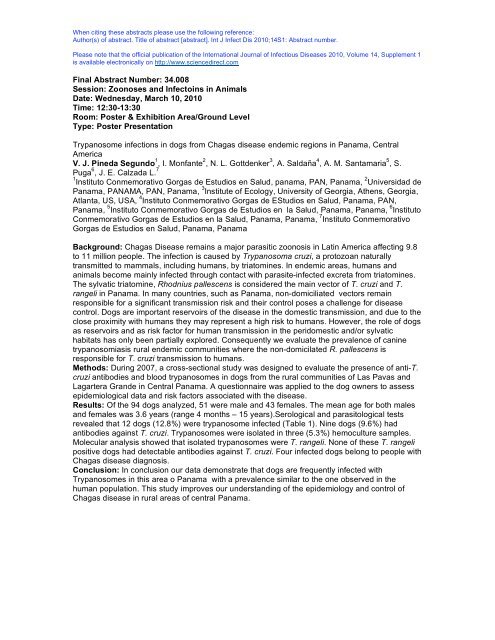14th ICID - Poster Abstracts - International Society for Infectious ...
14th ICID - Poster Abstracts - International Society for Infectious ...
14th ICID - Poster Abstracts - International Society for Infectious ...
Create successful ePaper yourself
Turn your PDF publications into a flip-book with our unique Google optimized e-Paper software.
When citing these abstracts please use the following reference:<br />
Author(s) of abstract. Title of abstract [abstract]. Int J Infect Dis 2010;14S1: Abstract number.<br />
Please note that the official publication of the <strong>International</strong> Journal of <strong>Infectious</strong> Diseases 2010, Volume 14, Supplement 1<br />
is available electronically on http://www.sciencedirect.com<br />
Final Abstract Number: 34.008<br />
Session: Zoonoses and Infectoins in Animals<br />
Date: Wednesday, March 10, 2010<br />
Time: 12:30-13:30<br />
Room: <strong>Poster</strong> & Exhibition Area/Ground Level<br />
Type: <strong>Poster</strong> Presentation<br />
Trypanosome infections in dogs from Chagas disease endemic regions in Panama, Central<br />
America<br />
V. J. Pineda Segundo 1 , I. Monfante 2 , N. L. Gottdenker 3 , A. Saldaña 4 , A. M. Santamaria 5 , S.<br />
Puga 6 , J. E. Calzada L. 7<br />
1 Instituto Conmemorativo Gorgas de Estudios en Salud, panama, PAN, Panama, 2 Universidad de<br />
Panama, PANAMA, PAN, Panama, 3 Institute of Ecology, University of Georgia, Athens, Georgia,<br />
Atlanta, US, USA, 4 Instituto Conmemorativo Gorgas de EStudios en Salud, Panama, PAN,<br />
Panama, 5 Instituto Conmemorativo Gorgas de Estudios en la Salud, Panama, Panama, 6 Instituto<br />
Conmemorativo Gorgas de Estudios en la Salud, Panama, Panama, 7 Instituto Conmemorativo<br />
Gorgas de Estudios en Salud, Panama, Panama<br />
Background: Chagas Disease remains a major parasitic zoonosis in Latin America affecting 9.8<br />
to 11 million people. The infection is caused by Trypanosoma cruzi, a protozoan naturally<br />
transmitted to mammals, including humans, by triatomines. In endemic areas, humans and<br />
animals become mainly infected through contact with parasite-infected excreta from triatomines.<br />
The sylvatic triatomine, Rhodnius pallescens is considered the main vector of T. cruzi and T.<br />
rangeli in Panama. In many countries, such as Panama, non-domiciliated vectors remain<br />
responsible <strong>for</strong> a significant transmission risk and their control poses a challenge <strong>for</strong> disease<br />
control. Dogs are important reservoirs of the disease in the domestic transmission, and due to the<br />
close proximity with humans they may represent a high risk to humans. However, the role of dogs<br />
as reservoirs and as risk factor <strong>for</strong> human transmission in the peridomestic and/or sylvatic<br />
habitats has only been partially explored. Consequently we evaluate the prevalence of canine<br />
trypanosomiasis rural endemic communities where the non-domicilated R. pallescens is<br />
responsible <strong>for</strong> T. cruzi transmission to humans.<br />
Methods: During 2007, a cross-sectional study was designed to evaluate the presence of anti-T.<br />
cruzi antibodies and blood trypanosomes in dogs from the rural communities of Las Pavas and<br />
Lagartera Grande in Central Panama. A questionnaire was applied to the dog owners to assess<br />
epidemiological data and risk factors associated with the disease.<br />
Results: Of the 94 dogs analyzed, 51 were male and 43 females. The mean age <strong>for</strong> both males<br />
and females was 3.6 years (range 4 months – 15 years).Serological and parasitological tests<br />
revealed that 12 dogs (12.8%) were trypanosome infected (Table 1). Nine dogs (9.6%) had<br />
antibodies against T. cruzi. Trypanosomes were isolated in three (5.3%) hemoculture samples.<br />
Molecular analysis showed that isolated trypanosomes were T. rangeli. None of these T. rangeli<br />
positive dogs had detectable antibodies against T. cruzi. Four infected dogs belong to people with<br />
Chagas disease diagnosis.<br />
Conclusion: In conclusion our data demonstrate that dogs are frequently infected with<br />
Trypanosomes in this area o Panama with a prevalence similar to the one observed in the<br />
human population. This study improves our understanding of the epidemiology and control of<br />
Chagas disease in rural areas of central Panama.
















